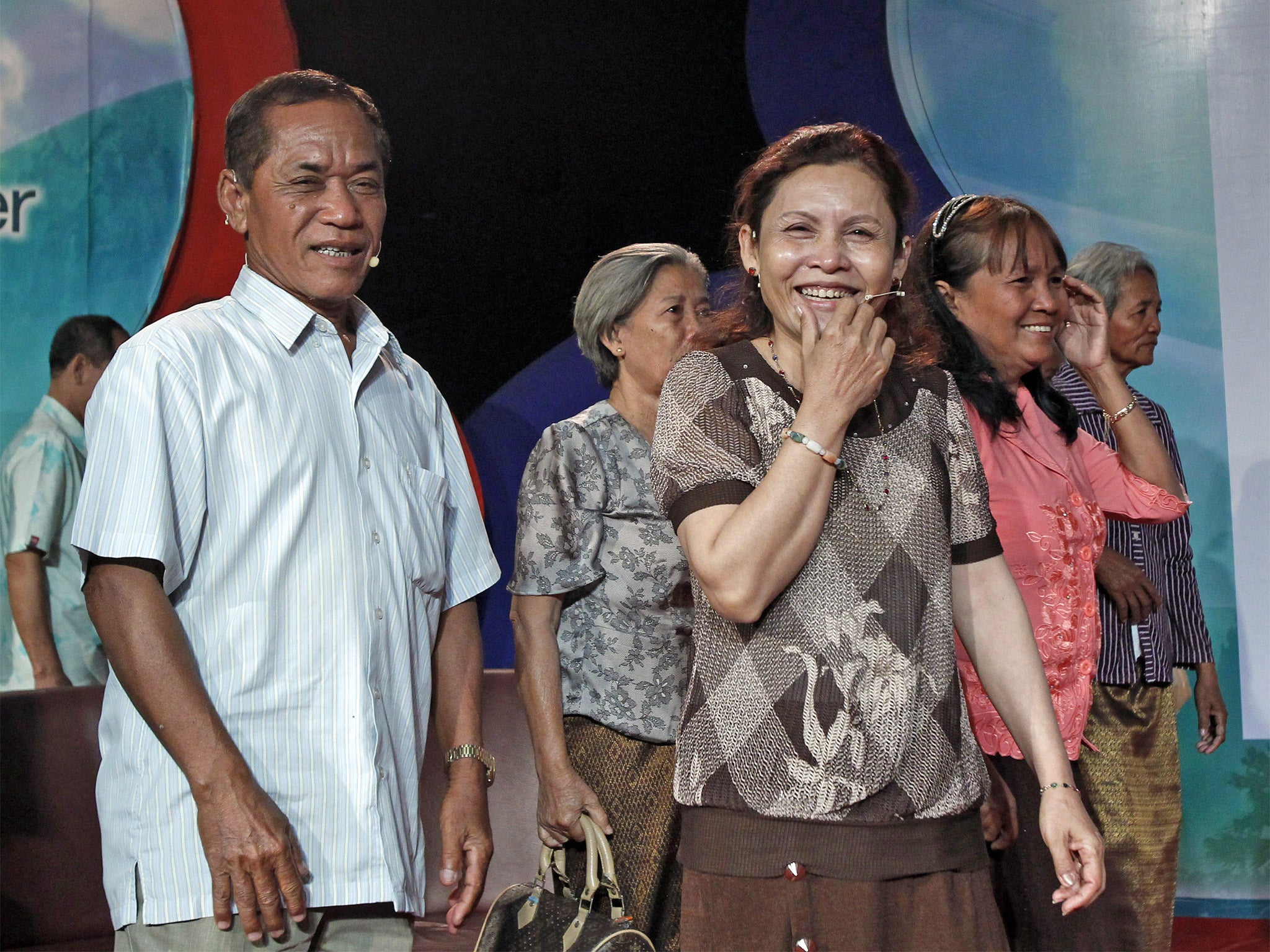It's Not a Dream: The Cambodian reality TV show that is bringing together families torn apart by the Khmer Rouge
Relatives separated in the 1970s are overwhelmed by emotion as they finally make contact

Tears welling in her eyes, Sam Somaly looked into the camera and pleaded to three siblings she had not seen in nearly 40 years – family lost to a nightmare that still haunts Cambodia today.
“I am your sister. I am looking for you,” she said, clasping her palms tightly together. “If you hear this… please come to me. I miss you so much. I’m getting sick because I miss you so much.”
The Khmer Rouge seized Cambodia in 1975 and broke families apart as they forced the entire population to work in the countryside in a bizarre attempt to construct an ultra-Communist agrarian society.
Ms Somaly knew her parents and one brother were among the nearly two million people who succumbed to overwork, starvation and execution during four years of Khmer Rouge rule. But the fate of two remaining brothers and a sister was a mystery she likens to “finding a needle at the bottom of the sea”.
But when she had all but given up, a glimmer of hope came. Not from a government aid programme or a humanitarian group, but reality television.
A show called It’s Not a Dream has transformed the darkest episode in Cambodian history into one of the modern world’s rawest forms of entertainment. Since it began in 2009, it has reunited dozens of families separated by the Khmer Rouge. When Ms Somaly contacted the station for help, a crew came to film her story.
Her video was first broadcast a year ago. For months, there was no response.
When black-clad Khmer Rouge fighters marched into Phnom Penh on 17 April 1975, the entire capital was forced to evacuate. Ms Somaly, aged around nine at the time, remembers soldiers firing in the air as they ordered people to board trains.
In the chaos, she was separated from her family.
Ms Somaly and her relatives were dispatched to separate villages in the northern province of Battambang. She managed to see some of them on rare occasions while they spent 12-hour days digging canals, building dams and tending to rice paddies.
When Vietnamese forces invaded in 1979 and put the Khmer Rouge on the run, Ms Somaly was briefly reunited with her youngest brother, then about six. But two days later, the Vietnamese army convoy they had been following was attacked, and the pair were separated again.

Watch Apple TV+ free for 7 days
New subscribers only. £8.99/mo. after free trial. Plan auto-renews until cancelled

Watch Apple TV+ free for 7 days
New subscribers only. £8.99/mo. after free trial. Plan auto-renews until cancelled
In July, a retired policeman, Aov Vantha, watching an It’s Not a Dream rerun, stumbled upon Ms Somaly’s clip. He recognised names he hadn’t heard in years – those of her father, Sam Seng, and her missing siblings, Sam Phalla, Sam Somala and Sam Sophath. He had known the family well in the early 1970s. Ms Somaly “seemed so lonely… My heart just went out to her”, Mr Vantha later recalled at his home, an hour’s drive from the capital. “All this time, we never searched for her, because we thought she was dead.”
Mr Vantha called Bayon TV, which broadcasts It’s Not a Dream. “When can I see her?” he asked. “You must be patient,” came the reply. The reunion, of course, would take place on television. Until then, Ms Somaly would know nothing.
Last month, Ms Somaly was invited to the studio to recount her story. The station did not tell her that 15 of her relatives, mostly cousins, would be waiting behind a partition just offstage.
The rapt audience was mainly composed of older Cambodians. Those too young to remember the Khmer Rouge – a majority of the country at this point – are less interested in the show.
The show began with Ms Somaly’s original video, followed by one featuring another cousin, and Mr Vantha slicing banana trees on his farm. Both said they longed to see her again. “Do you recognise these people?” the presenter asked Ms Somaly.
She didn’t, but the gravity of the intensely bittersweet moment was dawning. She was about to meet long-lost relatives, but not those she wanted most desperately to find.
“They are your cousins,” the presenter said. “Do you want to meet them now?”
As the sound of a violin playing the West Side Story tune “Somewhere” filled the studio, a cousin walked onstage. Ms Somaly, almost dazed, staggered into his embrace. The rest of the family streamed out and surrounded her as the audience applauded. Lights dimmed onstage, an overwhelmed Ms Somaly turned to the producer to thank her, and make one final plea. “Please find the rest of my family,” she said. “Please don’t give up.” Ms Sokhayouk, the producer, assured her she would not.
Subscribe to Independent Premium to bookmark this article
Want to bookmark your favourite articles and stories to read or reference later? Start your Independent Premium subscription today.

Join our commenting forum
Join thought-provoking conversations, follow other Independent readers and see their replies